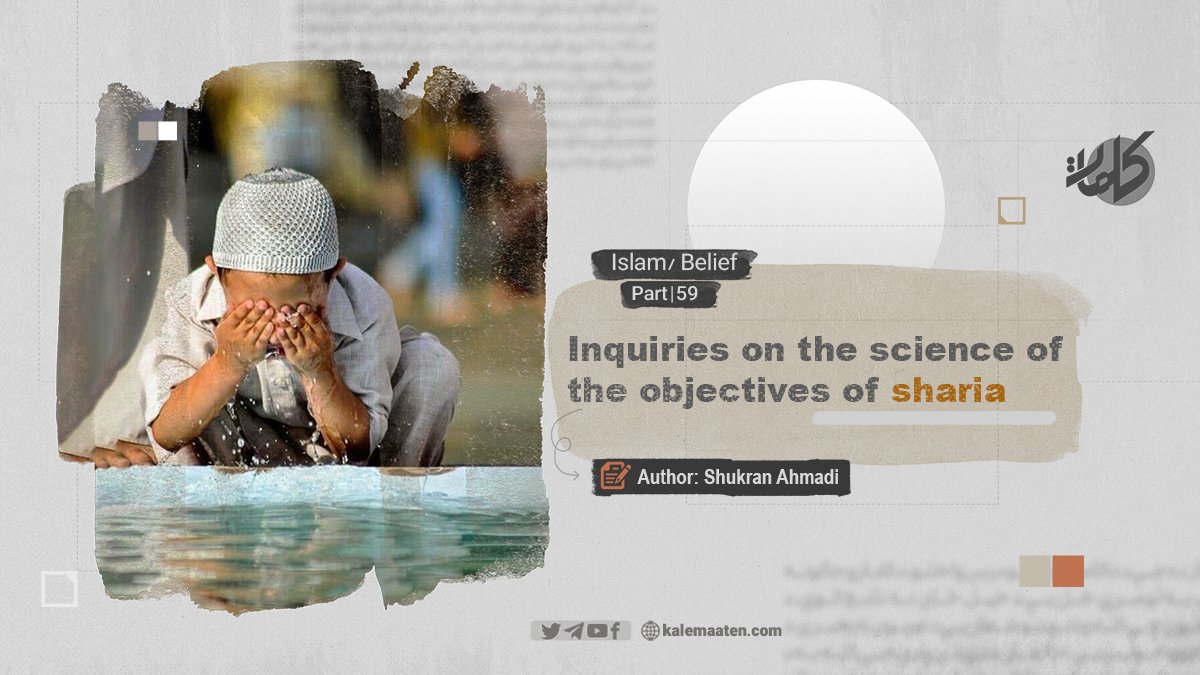Author: Shukran Ahmadi
Inquiries on the Science of the Objectives of Sharia (Part 59)
3. Partial Objectives
Partial objectives refer to the aims that the legislator pursues across all Sharia rulings—whether they are obligatory, forbidden, disliked, or recommended, etc. These objectives align with those referenced by Alal al-Fasi, who states: “…and the secrets that the legislator has in mind when legislating each of his rulings.”
In this context, objectives correspond with the examples provided by Ibn Ashur; for instance, the objective of a mortgage contract is to obtain certainty, the objective of a marriage contract is to establish and strengthen the family system, and the objective of legislating divorce is to prevent ongoing loss.
Jurists engage more with this category of objectives because they specialize in the details of Sharia and express these objectives during their Ijtihad and deductions. However, they may use other terms such as wisdom, cause, and meaning. Although these terms are not synonymous, they do possess precise distinctions.
The commentators of Hadith have also addressed this issue, with books specifically written on the principles and rules of objectives explaining some of these wisdoms and reasons, such as the works of Izz bin Abdul Salam and Shah Waliullah Dehlavi in Hujjat Ullah al-Balaigha.
Key Points
– Facilitation and Relief of Hardship: One of the general objectives on which the rules of Islamic law are based is the facilitation and relief of hardship; indeed, hardship may lead to a change in Sharia rulings.
– Specific Objectives: Specific objectives encompass various parts of worship, transactions, and punishments. For example, the specific objectives of prayer, fasting, Hajj, etc., are considered among the specific objectives.
– Partial Objectives: Partial objectives pertain to the purposes for which each Sharia ruling has been legislated. For instance, the objectives behind rulings on usury have prompted extensive discussions among scholars.
Summary of the Discussion
In this chapter, the types of Sharia objectives were examined. The Sharia objectives have been categorized and divided by jurists in various ways. One of the notable divisions of Sharia objectives is its classification into necessary objectives, needs, and praiseworthy acts.
This classification reflects the value and significance of the objectives and expresses the hierarchy among the objectives of Islamic Sharia. In cases of a conflict between necessary objectives and objectives of need, the former takes precedence due to their greater importance. Necessary objectives are further categorized into five critical aims: preserving religion, preserving life, preserving lineage, preserving intellect, and preserving wealth.
Additionally, in terms of scope, Sharia objectives can be divided into general objectives, personal objectives related to specific chapters, and partial objectives.
Continues…
References:
1. The Holy Quran.
2. Ibn Ashur al-Tunisi, Muhammad al-Tahir ibn Muhammad al-Tahir (2004 AD), The Objectives of Islamic Law, edited by Muhammad al-Habib ibn al-Khuja, Qatar, Ministry of Endowments and Islamic Affairs.
3. Al-Raysuni, Ahmad (1992 AD). The Theory of Objectives according to Imam al-Shatibi, The International House of Islamic Books.
4. Al-Shatibi, Ibrahim ibn Musa ibn Muhammad al-Lakhmi al-Gharnati, Al-Muwafeqat fi Usul al-Sharia, edited by Abu Ubaidah Mashhur ibn Hasan Al Salman, Dar Ibn Affan.
5. Al-Qushayri, Abu al-Husayn Muslim ibn al-Hajjaj al-Naysaburi (133 AH). Sahih Muslim, Beirut, Lebanon, Dar al-Jeel.
6. Al-Yubi, Muhammad Sa’ad ibn Ahmad ibn Mas’ud, The Objectives of Islamic Law and Their Relationship to Legal Evidence, Riyadh, Dar al-Hijr for Publishing and Distribution.
7. Zarkashi, Badr al-Din, Muhammad ibn Bahadur, Al-Bahr al-Muhit fi Usul al-Fiqh, Dar al-Kutub al-Ilmiyyah, Beirut, Lebanon.
8. Al-Ghazali, Abu Hamid, Muhammad ibn Muhammad, al-Mustasfi fi Ilm Usul al-Fiqh, Beirut, Al-Risalah Foundation.
9. Ibn Qayyim Jawziyya, Muhammad ibn Abi Bakr, Shifa’ al-‘Alil fi Masail al-Qada’ wa al-Qadar wa al-Hikmah wa al-Ta’lil, Dar al-Ma’rifah, Beirut, Lebanon.
10. Amadi, Abu al-Hasan Sayyed al-Din, Ali ibn Abi, Ali ibn Muhammad, Ghayat al-Maram, Publisher: Supreme Council for Islamic Affairs.
11. Fakhr al-Din al-Razi, Abu Abdullah, Muhammad bin Omar al-Razi, Mafatih al-Ghayb, The Great Interpretation, Al-Risala Organization.
12. Ibn Hazm, Abu Muhammad Ali bin Hazm Andalusi Zahiri, Al-Ahkam fi Usul Al-Ahkam, Beirut, Dar Al-Jeel.
13. Ibn Qayyim Jawziyah, Muhammad bin Abi Bakr, The Key to the House of Happiness and the publication of the Guardianship of Knowledge and Will, Cairo, Dar Al-Hadith.
14. Muhammad Mustafa Zuhayli (2006 AD) Al-Wajeez on Fundamentals of Islamic Jurisprudence, Damascus – Syria, Dar Al-Khair for Printing, Publishing, and Distribution.
15. Abu Dawud, Suleiman bin Al-Ash’ath Al-Sijistani, Sunan Abi Dawud, Beirut, Lebanon, Al-Maktabah Al-Asriyya, Sidon.
16. Al-Najdi, Sami, The Importance of Legal Objectives, Dar Al-Kutub al-Ilmiyyah, Beirut, Lebanon.
17. Muhammad ibn Ahmad, Abu Abdullah al-Qurtubi, (1962 AD) Tafsir al-Qurtubi, edited by: Ahmad al-Bardouni and Ibrahim Atfeesh. Cairo, Egyptian National Library.



